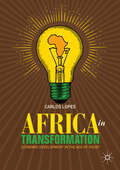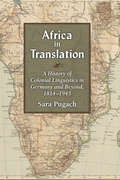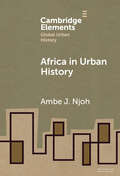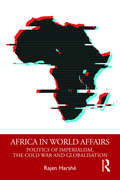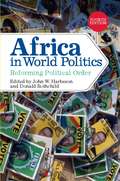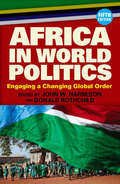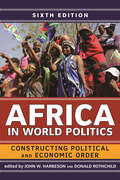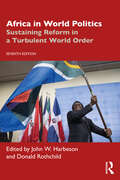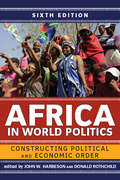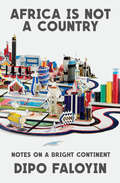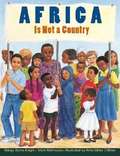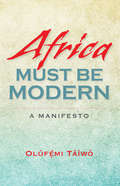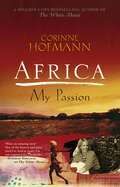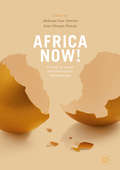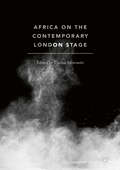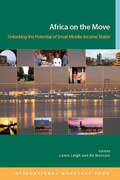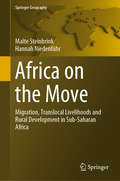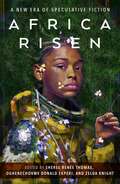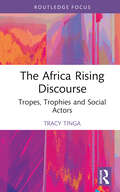- Table View
- List View
Africa in Transformation: Economic Development in the Age of Doubt
by Carlos Lopes“Lopes brings his rigour, insight, and experience to this timely new book, presenting a compelling rethink of traditional development models in Africa and the need to seize on transformational change to build a sustainable future for the continent."—Kofi Annan, former United Nations Secretary General “Some readers will enjoy Lopes’ eclectic brilliance and breath-taking culture. Others will salute his ability to bring compelling new angles to every topic. Everyone will be impressed with his craftsmanship, his rich and multi-faceted approach to development, and his high ethical standards. It is impossible to read this jewel book and not feel smarter.”—Célestin Monga, African Development Bank’s Vice President and Chief Economist “Drawing on his distinguished academic career, policy experience at the highest level, and deep love of the continent, Lopes provides a visionary analysis of Africa's current problems and future prospects. This book provides a highly unusual combination of intellectualism and hard-nosed pragmatism. A singular achievement.” —Ha-Joon Chang, University of Cambridge, UK“Thorough, thought-provoking, and beyond rhetoric: definitely a must-read for anyone who wants to understand Africa’s present and future.”—Enrico Letta, former Prime Minister of Italy, Dean of the Paris School of International Affairs, Sciences Po, France Lopes delivers an overview of the critical development issues facing the African continent today. He offers readers a blueprint of policies to address issues, and an intense, heartfelt meditation on the meaning of economic development in the age of democratic doubts, identity crises, global fears and threatening issues of sustainability.
Africa in Translation: A History of Colonial Linguistics in Germany and Beyond, 1814-1945
by Sara Pugach"Africa in Translationis a thoughtful contribution to the literature on colonialism and culture in Germany and will find readers in the fields of German history and German studies as well as appealing to audiences in the large and interdisciplinary fields of colonialism and postcolonialism. " ---Jennifer Jenkins, University of Toronto The study of African languages in Germany, or Afrikanistik, originated among Protestant missionaries in the early nineteenth century and was incorporated into German universities after Germany entered the "Scramble for Africa" and became a colonial power in the 1880s. Despite its long history, few know about the German literature on African languages or the prominence of Germans in the discipline of African philology. InAfrica in Translation: A History of Colonial Linguistics in Germany and Beyond, 1814--1945, Sara Pugach works to fill this gap, arguing that Afrikanistik was essential to the construction of racialist knowledge in Germany. While in other countries biological explanations of African difference were central to African studies, the German approach was essentially linguistic, linking language to culture and national identity. Pugach traces this linguistic focus back to the missionaries' belief that conversion could not occur unless the "Word" was allowed to touch a person's heart in his or her native language, as well as to the connection between German missionaries living in Africa and armchair linguists in places like Berlin and Hamburg. Over the years, this resulted in Afrikanistik scholars using language and culture rather than biology to categorize African ethnic and racial groups. Africa in Translationfollows the history of Afrikanistik from its roots in the missionaries' practical linguistic concerns to its development as an academic subject in both Germany and South Africa throughout the nineteenth and twentieth centuries. Sara Pugach is Assistant Professor of History at California State University, Los Angeles. Jacket image: Perthes, Justus. Mittel und Süd-Afrika. Map. Courtesy of the University of Michigan's Stephen S. Clark Library map collection.
Africa in Urban History (Elements in Global Urban History)
by Ambe J. NjohThis Element in Global Urban History seeks to promote understanding of the urban history of Africa. It does so by undertaking four main tasks. Firstly, it employs race, ethnicity, class, and conflict theory as conceptual frameworks to analyze the spatial structures, social, and political-economic dynamics of African cities from global, comparative, and transnational perspectives. Secondly, it proposes a new typology of the continent's cities. Thirdly, it identifies and draws into focus an important but oft-ignored part of Africa's urban history, namely Indigenous cities. It focuses more intensely on the few that still exist to date. Fourthly, it employs conflict, functional, and symbolic interactionist theories as well as elements of the race ideology to explain the articulation of racism, ethnicity, and classism in the continent's urban space. This is done mainly but not exclusively from historical perspectives.
Africa in World Affairs: Politics of Imperialism, the Cold War and Globalisation
by Rajen HarshéAfrica finds itself at the centre stage of world politics in the twenty-first century. To truly determine its rising influence and role in world affairs would mean unravelling the politics of imperialism, the Cold War and globalisation. Going beyond Euro-American perspectives, this book presents a comprehensive study of Africa and its role in world politics. Africa in World Affairs: • Closely examines the transition of Africa in its colonial and post-colonial phases; • Explores the intellectual history of modern Africa through liberation struggles, social movements, leaders and thinkers; • Investigates the continent’s relationships with former colonial powers such as Britain, France and Portugal; untangles complexities of French neo-colonialism and sheds light on the role of the superpower, such as the USA and major and rising powers like China and India; • Highlights complex and wide-ranging diversities of the region, and the ways in which it continues to negotiate with issues of modernity, racism and globalisation. A core text on Africa and the world, this book will be indispensable for students of African studies, politics and international relations, and history. It will also be a must-read for policymakers, diplomats and government think tanks.
Africa in World Politics
by HarbesonIn this fully revised edition top scholars in African politics address the effects that major currents in Africa and world politics have upon each other and explore the ramifications of this interconnection for contemporary theories of international and comparative politics. The fourth edition focuses on issues of reforming and strengthening states and their economies in sub-Saharan Africa. The nation-state as we know it is a legacy of European rule in Africa, and the primacy of the nation-state remains a bedrock of most contemporary theories of international relations. Yet in the fifth decade of Africa's independence, this colonial inheritance has been challenged as never before by state weakness, internal and inter-state conflict, and internal and external demands for economic and political reform, with potentially far-reaching implications. Including new readings on the AIDS crisis in Africa and the regional war on terrorism, this text remains an invaluable resource for students of African and world politics.
Africa in World Politics
by HarbesonPolitical scientists and economists examine issues presented by the improvements in domestic economic and politics in sub-Saharan Africa and the emergence of the region onto the world stage. Among their topics are the heritage of colonialism, promising democratization trajectories in Africa's weak states, inter-African negotiations and reforming political order, and China's engagement in Africa. Annotation ©2008 Book News, Inc. , Portland, OR (booknews. com)
Africa In World Politics: Post-Cold War Challenges
by John Harbeson Donald RothchildAfrican states have been on the periphery of world politics since independence, and they will likely continue to be marginalized as Cold War tensions disappear and economic and political ties to the industrialized world weaken. This book explores Africa’s changing position, addressing the region’s colonial heritage as well as the historical, economic, and cultural factors that have shaped the continent’s standing in world affairs. The contributors also analyze some of the most intense conflicts and examine the evolution of relations with other regions and powers.The second edition of Africa in World Politics has been fully revised and updated to explore trends in the region and the world. The focus on Russia’s role in contemporary Africa has been significantly reduced, and francophone Africa and regional organizations have been given increased coverage. In addition, important new issues such as democratization, conflict resolution, territorial concerns, and humanitarian intervention are covered in depth. The result is a thought-provoking and up-to-date text written by leading scholars in their fields.
Africa in World Politics
by John W. Harbeson Donald RothchildIn this fully revised edition top scholars in African politics address the effects that major currents in Africa and world politics have upon each other and explore the ramifications of this interconnection for contemporary theories of international and comparative politics. The fifth edition focuses on engaging a changing world order. The nation-state as we know it is a legacy of European rule in Africa, and the primacy of the nation-state remains the bedrock of most contemporary theories of international relations. Yet in the fifth decade of Africa’s independence, this colonial inheritance has been challenged as never before by state weakness, internal and inter-state conflict, new gains in economic development, large investments by China and other G-20 countries, and internal and external demands for economic and political reform, with potentially far-reaching implications. Including new readings on the Sudan, the Great Lakes crisis, and bilateral vs. multilateral peacekeeping on the continent, this text remains an invaluable resource for students of African and world politics.
Africa in World Politics: Constructing Political and Economic Order
by John W Harbeson Donald RothchildThe sixth edition of Africa in World Politics focuses on challenges African states face in constructing viable political economies in contexts both of familiar domestic challenges and an unprecedented mix of engagements, opportunities, and threats emanating from a turbulent and rapidly changing international order. This text, including new chapters on Nigeria and the influence of party politics on economic development, remains an invaluable resource for students of African politics seeking to navigate the continent's complex political and economic landscapes. Revised chapters consider both the extent and the limits of continued healthy growth rates in many countries; the impacts of investments by China and other BRICS countries; plateaus and some reversals in progress on human rights and democratization; dimensions of chronic state weakness deepened by insurgencies, including some that are connected to Al Qaeda and the Islamic State; and peacebuilding efforts struggling to uphold responsible sovereignty in the Sudans, the Great Lakes region, and elsewhere.
Africa in World Politics: Sustaining Reform in a Turbulent World Order
by John W. Harbeson Donald RothchildAfrica in World Politics provides advanced undergraduate and graduate students with the perfect introduction to the challenges faced by African states on an increasingly turbulent world stage. Africa in World Politics has long served as the go-to resource for students of African politics seeking to navigate the continent’s complex political and economic landscapes. Updated throughout, this new edition includes new chapters on the unprecedented challenges the continent faces from climate change and the fallout of the COVID-19 global pandemic. Adding to existing coverage of international diplomacy, peacebuilding, women in politics, and the building blocks of political economy, the book also includes expanded coverage of the role of China in Africa, and fresh perspectives on decolonization. Drawing together insights from some of the world’s leading scholars of African politics, this textbook is an essential read for advanced students of political science and African studies.
Africa in World Politics
by John W Harbeson Donald RothchildIn this fully revised edition top scholars in African politics address the effects that major currents in Africa and world politics have upon each other and explore the ramifications of this interconnection for contemporary theories of international and comparative politics.The fourth edition focuses on issues of reforming and strengthening states and their economies in sub-Saharan Africa. The nation-state as we know it is a legacy of European rule in Africa, and the primacy of the nation-state remains a bedrock of most contemporary theories of international relations. Yet in the fifth decade of Africa's independence, this colonial inheritance has been challenged as never before by state weakness, internal and inter-state conflict, and internal and external demands for economic and political reform, with potentially far-reaching implications. Including new readings on the AIDS crisis in Africa and the regional war on terrorism, this text remains an invaluable resource for students of African and world politics.
Africa in World Politics: Constructing Political and Economic Order
by John W Harbeson,Donald RoThe sixth edition of Africa in World Politics focuses on challenges African states face in constructing viable political economies in contexts both of familiar domestic challenges and an unprecedented mix of engagements, opportunities, and threats emanating from a turbulent and rapidly changing international order. This text, including new chapters on Nigeria and the influence of party politics on economic development, remains an invaluable resource for students of African politics seeking to navigate the continent's complex political and economic landscapes. Revised chapters consider both the extent and the limits of continued healthy growth rates in many countries; the impacts of investments by China and other BRICS countries; plateaus and some reversals in progress on human rights and democratization; dimensions of chronic state weakness deepened by insurgencies, including some that are connected to Al Qaeda and the Islamic State; and peacebuilding efforts struggling to uphold responsible sovereignty in the Sudans, the Great Lakes region, and elsewhere.
Africa in World Politics
by Donald Rothchild John W HarbesonIn this fully revised edition top scholars in African politics address the effects that major currents in Africa and world politics have upon each other and explore the ramifications of this interconnection for contemporary theories of international and comparative politics.The fifth edition focuses on engaging a changing world order. The nation-state as we know it is a legacy of European rule in Africa, and the primacy of the nation-state remains the bedrock of most contemporary theories of international relations. Yet in the fifth decade of Africa's independence, this colonial inheritance has been challenged as never before by state weakness, internal and inter-state conflict, new gains in economic development, large investments by China and other G-20 countries, and internal and external demands for economic and political reform, with potentially far-reaching implications. Including six new chapters on warfare, bilateral vs. multilateral peacekeeping, Sudan, the Great Lakes Crisis, and China and Africa, this text remains an invaluable resource for students of African and world politics.
Africa in World Politics
by Donald Rothchild John W HarbesonIn this fully revised edition top scholars in African politics address the effects that major currents in Africa and world politics have upon each other and explore the ramifications of this interconnection for contemporary theories of international and comparative politics.The fourth edition focuses on issues of reforming and strengthening states and their economies in sub-Saharan Africa. The nation-state as we know it is a legacy of European rule in Africa, and the primacy of the nation-state remains a bedrock of most contemporary theories of international relations. Yet in the fifth decade of Africa's independence, this colonial inheritance has been challenged as never before by state weakness, internal and inter-state conflict, and internal and external demands for economic and political reform, with potentially far-reaching implications. Including new readings on the AIDS crisis in Africa and the regional war on terrorism, this text remains an invaluable resource for students of African and world politics.
Africa Is Not a Country: Notes On A Bright Continent
by Dipo FaloyinA Literary Hub Most Anticipated Book of 2022 An exuberant, opinionated, stereotype-busting portrait of contemporary Africa in all its splendid diversity, by one of its leading new writers. So often, Africa has been depicted simplistically as a uniform land of famines and safaris, poverty and strife, stripped of all nuance. In this bold and insightful book, Dipo Faloyin offers a much-needed corrective, weaving a vibrant tapestry of stories that bring to life Africa’s rich diversity, communities, and histories. Starting with an immersive description of the lively and complex urban life of Lagos, Faloyin unearths surprising truths about many African countries’ colonial heritage and tells the story of the continent’s struggles with democracy through seven dictatorships. With biting wit, he takes on the phenomenon of the white savior complex and brings to light the damage caused by charity campaigns of the past decades, revisiting such cultural touchstones as the KONY 2012 film. Entering into the rivalries that energize the continent, Faloyin engages in the heated debate over which West African country makes the best jollof rice and describes the strange, incongruent beauty of the African Cup of Nations. With an eye toward the future promise of the continent, he explores the youth-led cultural and political movements that are defining and reimagining Africa on their own terms. The stories Faloyin shares are by turns joyful and enraging; proud and optimistic for the future even while they unequivocally confront the obstacles systematically set in place by former colonial powers. Brimming with humor and wit, filled with political insights, and, above all, infused with a deep love for the region, Africa Is Not a Country celebrates the energy and particularity of the continent’s different cultures and communities, treating Africa with the respect it deserves.
Africa is Not a Country
by Anne Sibley O'BrienEnter into the daily life of children in the many countries of modern Africa. Countering stereotypes, Africa Is Not a Country celebrates the extraordinary diversity of this vibrant continent as experienced by children at home, at school, at work, and at play.
Africa Must Be Modern
by Olúfemi TáíwòIn a forthright and uncompromising manner, Olúfémi Táíwò explores Africa's hostility toward modernity and how that hostility has impeded economic development and social and political transformation. What has to change for Africa to be able to respond to the challenges of modernity and globalization? Táíwò insists that Africa can renew itself only by fully engaging with democracy and capitalism and by mining its untapped intellectual resources. While many may not agree with Táíwò's positions, they will be unable to ignore what he says. This is a bold exhortation for Africa to come into the 21st century.
Africa, My Passion
by Corinne HofmannIn an exquisite personal pilgrimage, Corinne Hofmann delves into the slums of Nairobi to uncover the heart-warming and heart-breaking stories of unforgettable people and places, then treks 500 miles across the Namibian desert to discover the lives of the nomadic Himba people. Joined by her half-Kenyan daughter, Napirai, they travel to Nairobi together for the first time to discover Napirai s roots and finally meet her father and half-siblings. Africa, My Passion is a poignant, touching and exciting story about one woman's love affair with a unique man, which led to a lifelong obsession with Africa. Moving, vividly recounted, eye-opening and, above all, filled with passionate hope and unparalleled detail, this is an extraordinary sequel to a bestselling series of memoirs.
Africa, My Passion
by Corinne HofmannIn an exquisite personal pilgrimage, Corinne Hofmann delves into the slums of Nairobi to uncover the heart-warming and heart-breaking stories of unforgettable people and places, then treks 500 miles across the Namibian desert to discover the lives of the nomadic Himba people. Joined by her half-Kenyan daughter, Napirai, they travel to Nairobi together for the first time to discover Napirai s roots and finally meet her father and half-siblings. Africa, My Passion is a poignant, touching and exciting story about one woman's love affair with a unique man, which led to a lifelong obsession with Africa. Moving, vividly recounted, eye-opening and, above all, filled with passionate hope and unparalleled detail, this is an extraordinary sequel to a bestselling series of memoirs.
Africa Now!: Emerging Issues and Alternative Perspectives
by Adebusuyi Adeniran Lanre IkuteyijoThis book presents relevant and timely endogenous procedures for addressing the challenge of transforming ideas into sustainable opportunities in Africa. It explores how Africa could be understood in the context of emerging global realities, providing alternative frameworks that will not just be participatory in conception and practice, but equally show a contextual workability for the varying aspects of the developmental enterprise in Africa. Despite having alternative and less cumbersome sources of funding, with commendable economic growth indices, and several economies among the fastest growing globally, African countries have been unable to transmute related opportunities into sustainable human development outcomes for majority of its citizenry. Over four rich sections the authors cover subjects ranging from environment and natural resource management, to governance, economy and sustainable development. The book continues with a section on Education and Human Development and a case study in transnationalism. The final section discusses crime, conflict and regional dynamics, including highly disputed topics such as forced migration and sex trade. This indispensable resource will be of great use to students and researches globally in fields such as sociology, anthropology, environmental studies, politics and economics with a focus on contemporary Africa, as well as to policy planners and human rights activists invested in the future development of Africa.
Africa on the Contemporary London Stage
by Tiziana MorosettiThis collection of essays investigates the way Africa has been portrayed on the London stage from the 1950s to the present. It focuses on whether — and, if so, to what extent — the Africa that emerges from the London scene is subject to stereotype, and/or in which ways the reception of audiences and critics have contributed to an understanding of the continent and its arts. The collection, divided into two parts, brings together well-established academics and emerging scholars, as well as playwrights, directors and performers currently active in London. With a focus on Wole Soyinka, Athol Fugard, Bola Agbaje, Biyi Bandele, and Dipo Agboluaje, amongst others, the volume examines the work of key companies such as Tiata Fahodzi and Talawa, as well as newer companies Two Gents, Iroko Theatre and Spora Stories. Interviews with Rotimi Babatunde, Ade Solanke and Dipo Agboluaje on the contemporary London scene are also included.
Africa on the Move: Unlocking the Potential of Small Middle-Income States
by Lamin Leigh Ali MansoorThis publicationd escribes the reforms needed to move small middle-income countries in sub-Saharan Africa to advanced-economy status. The result of intense discussions with public officials in the countries covered, the book blends rigorous theory, econometrics, and practitioners' insights to come up with practical recommendations for policymakers. It spans topics from macroeconomic vulnerability and reserve adequacy to labor market institutions and financial inclusion. The publicaiton is a must-read for researchers interested in the economic issues facing developing countries in sub-Saharan Africa.
Africa on the Move: Migration, Translocal Livelihoods and Rural Development in Sub-Saharan Africa (Springer Geography)
by Malte Steinbrink Hannah NiedenführThis book discusses migration and space-spanning social network relationships as normal realities of life in African societies. It offers an overview of the research landscape and introduces an agency-centered theoretical model that provides a conceptual framework for translocality. The authors Malte Steinbrink and Hannah Niedenführ plead for a translocal approach to social transformation, showing how the translocality of livelihoods is shaping the lives of half a billion people on the continent and impacting local conditions. Using an action-oriented approach, the book analyzes the effects of translocal livelihoods on diverse aspects of economic, environmental and social change in rural Sub-Saharan Africa. The study thus makes an innovative contribution not only to migration research and development studies but also to the discussion around the policy and practice of development cooperation and planning. It is time to rethink development in light of translocal realities. The book appeals to scholars and researchers in geography, sociology, policy-making and planning, development studies, migration research and rural development.
Africa Risen: A New Era of Speculative Fiction
by Sheree Renée Thomas Oghenechovwe Donald Ekpeki Zelda KnightWinner of the 2023 World Fantasy Award for Best AnthologyWinner of the 2023 Locus Award for Best AnthologyA 2023 NAACP Image Award NomineeA 2023 British Fantasy Award NomineeA NPR Best of the Year pickA Book Riot Best SFF of the Year pick"[A] magnificent and wide-ranging anthology . . . A must-read for all genre fans."—Publishers Weekly, starred reviewFrom award-winning editorial team Sheree Renée Thomas, Oghenechovwe Donald Ekpeki, and Zelda Knight comes an anthology of thirty-two original stories showcasing the breadth of fantasy and science fiction from Africa and the African Diaspora.A group of cabinet ministers query a supercomputer containing the minds of the country’s ancestors. A child robot on a dying planet uncovers signs of fragile new life. A descendent of a rain goddess inherits her grandmother’s ability to change her appearance—and perhaps the world.Created in the legacy of the seminal, award-winning anthology series Dark Matter, Africa Risen celebrates the vibrancy, diversity, and reach of African and Afro-Diasporic SFF and reaffirms that Africa is not rising—it’s already here.At the Publisher's request, this title is being sold without Digital Rights Management Software (DRM) applied.
The Africa Rising Discourse: Tropes, Trophies and Social Actors (Routledge Contemporary Africa)
by Tracy TingaOver the last 25 years, the "Africa Rising" discourse has been used to signify hope and promise for the continent, marking a break from previous pessimistic portrayals. This book critically examines that discourse, analyzing recurring themes, tropes, metaphors, and imagery.It traces the evolution of the "Africa Rising" discourse and its connection with Afro-pessimism, providing valuable insights into how the continent is represented and understood. The book explores the tensions, contradictions and impacts of labeling Africa as "rising". Focusing on both local and global social actors, as well as geopolitical influences, it examines how these forces have shaped the discourse over time. Additionally, it highlights how African actors have engaged with and modified the discourse. For instance, the book assesses how in recent years digital media platforms have offered spaces for counternarratives that challenge stereotypical representations, leading to a more nuanced and diverse understanding of Africa’s rise.This book offers valuable insights for researchers in Media and Communication Studies, Digital Media, Journalism, African Studies, and Global Studies.
